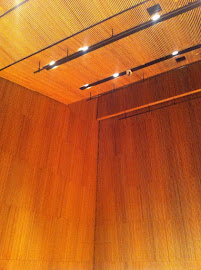Attending a concert of "classical" music is usually an exercise in reviewing interpretation. More often than not, the music is familiar, from another time, or both. If you don't like Mozart, it's unlikely you're going to spend your precious time to check out how one group's approach may differ from another. However, when it comes to contemporary classical, often referred to as "new music," the music could very well be new to you (and everyone else in the room) and the evaluation of the performance and the composition itself becomes more intertwined.
After seeing two concerts by the Talea Ensemble, I am unshakably convinced that the depth of their preparation, the sincerity of their engagement and enthusiasm, and their technical mastery, can produce definitive and transparent performances of whatever they choose to do. Talea's work is a gift to composers and listeners, allowing these often challenging works to be put forth into our experience as complete works of art.
Their most recent appearance was in the stunning and acoustically rich space in the basement of the Baryshnikov Arts Center (pictured above). The opening work was called Tractus, by a young composer studying at Columbia University named Victor Adan. Beginning with breathy sounds and sustained woodsy scrapings from the viola, the heart of the piece is soon revealed to be the percussion. Whether in beats on a low-tuned tomtom or a violin bow eliciting squeaks and sighs from a block of styrofoam, most of the tonal color resided there. While there is apparently an improvisational element to Adan's work, there was enough pattern and repetition that Tractus became a playfully terrifying little machine. I couldn't help being reminded of some of the more outré songs by art rock legends Pere Ubu, for example A Small Dark Cloud from 1979's New Picnic Time. Adan is obviously one to watch.
The second composition was the one that gave the ensemble it's name, Talea, completed by Gerard Grisey in 1986. A French composer born in 1946, Grisey studied with such luminaries as Olivier Messiaen, Gyorgy Ligeti and Iannis Xenakis, and also trained at Pierre Boulez's IRCAM. In short, he was groomed and poised to become a new music superstar, and had the talent to match, before being tragically felled by an aneurysm in 1998 at the age of 52. Talea comes around the middle of his output and was the first piece I've heard by him. From the first few bars, Grisey's deep understanding and love of the sounds of instruments comes to the forefront and i was luxuriating in instrumental textures and timbres. A multicolored explosion of rising, falling and resonant sounds, Talea also featured pile-driving unison riffs that seemed drenched in the sonorities of progressive rock. While it stopped and started regularly, Talea's forward motion was undeniable, and undeniably exciting. "I've never been disappointed in a piece by Grisey," I overheard another concertgoer say. And now I can say the same - and that I'm looking forward to more.
After a brief intermission, all the lights (except those on the music stands) were turned off and we were exposed to Salvatore Sciarriino's challenging and mysterious Infinito Nero for mezzo soprano and ensemble. Composed in 1998, this work hovers at an intersection of music, sound art and theater. The text comes from the ecstatic and bloody ravings of a 17th century saint named Maria Maddelena de' Pazzi. According to Sciarrino, she did not speak, rather "...words actually shot out of her like a machine gun and then she fell silent for a long period." Even though those long silences are part of the work, the role of the singer is extraordinarily difficult. Bo Chang's lush tone and incredible concentration brought it off with aplomb. The sound world of the piece consists mainly of windy whistles, glottal plops and occasional melodic fragments. There were moments of such quiet that the breathing and shifting organism of the audience became almost a Cagian collaborator in the music making; it was impossible to separate any of the sounds in the hall from the composition itself.
In the end, I couldn't help but think that Sciarrino had committed an amazing act of empathy, putting us in the head of this mystic madwoman as she yelped such visions as: "They are the/Wounds in which I lose myself/Come, come/With the crown: its long thorns pierce/The eternal father in heaven/He writes on me with his blood." The sounds with which Sciarrino surrounds these words could be seen as the saint's breathing and swallowing as she waited for inspiration, or that of her attendants as they waited for her words, or of the breeze blowing through the skulls on Mount Golgotha as Jesus died on the cross. Powerful stuff, indeed.
The Talea Ensemble performs again in our area on May 27th and June 9th. Take a chance and you might find yourself with a new habit.
Subscribe to:
Post Comments (Atom)

No comments:
Post a Comment